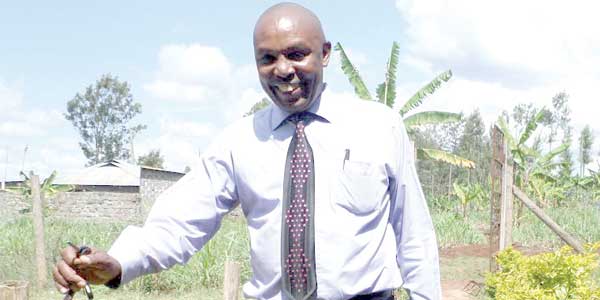After graduating from Kenyatta University in 1990 with a BA in Education, Leonard Ndabi Ngugi worked as a teacher with several government and private schools. Contrary to expectations, he opted for early retirement to start his own school.
He resigned in 1998 after teaching at Brook House School for seven years. He resigned to start Newspring School in 1999, which offered primary education before he converted it into a college in 2004. The college is located at Kwambira Limuru, Kiambu.
Ngugi says although his dream of starting a school was realised, the low transition rate to college of most learners bothered him. “I did my research and realised that most colleges and universities were located in big towns and people from rural areas especially mothers couldn’t access them.
I decided to start a college mainly targeting people from rural areas,” he says. He consulted most of his friends, but he didn’t have any idea of how he could reach that specific group.
One day, he was attending a mass service and a thought crossed his mind. “I realised that churches are always busy only on Sundays, but one week days, the spaces are under exploited. Consequently, I decided to use church as my training ground,” says the 47-year-old who lives in Limuru, Kiambu County.
In 2004, the father of three from Mangu posted an announcement on church notice boards for people who were interested in getting training on tie and dye. Immediately, more than 38 people responded. “I quit my job and embarked on training. I named my organisation Maisha Bora Nyumbani,” he says.
Every person was supposed to pay Sh560 to contribute towards buying the equipment needed. After, five months, he introduced courses on soap, detergent, disinfectant and shampoo production and more people enrolled.
“Both projects were successful and this is when most people started asking me if I could introduce baking classes. As an open minded businessman, I saw another opportunity and decided to venture into it,” he says. From his saving, he bought baking equipment worth Sh28,000.
Mothers turned up in big numbers. Each student was supposed to pay Sh2,500 per month. With demand for training going up, he started using church halls as classrooms and even introduced other courses. Consequently, his Maisha Bora Nyumbani College was born.
It offers divergent catering courses. “I have bought the neccessary equipment, which are needed and students are needed to provide their own ingredients and this is why the charges are this low because we don’t pay for the facilities,” he says.
Ngugi says the demand for caterers has steadily increased as the demand for convenient meals and eating away from home has increased. Since its inception in 2004, the catering college has trained more than 6,000 students and has grown to an estimated Sh100million in worth.
He has 14 branches across Nairobi and Kiambu with a staff of 10 and plans to expand to other counties. “This business venture has enabled me to buy four-and-half acres of land in Naivasha where am planning to open a catering college and also eight acres in Narok,” he says.
He still works with churches and gives them ‘something as a token of appreciation’. The other approach he uses is to train clergy and church staff for free. His advice to young entrepreneurs is: “There is room for profit no matter how small the business is.
However, to be successful you must understand your are investment inside out.” He says that no matter how large or small a catering business is, it is not possible to master all types of foods. “The proprietor should come up with a concept for the catering business and specialise on particular events and types of food.
Coming up with a solid concept or idea for the business will make it easier to market the company and target specific clientele,” he says. One of his favourite quotes, one he tells students is: “In catering, you are always changing; the client is always dictating to you in terms of their wishes.”









